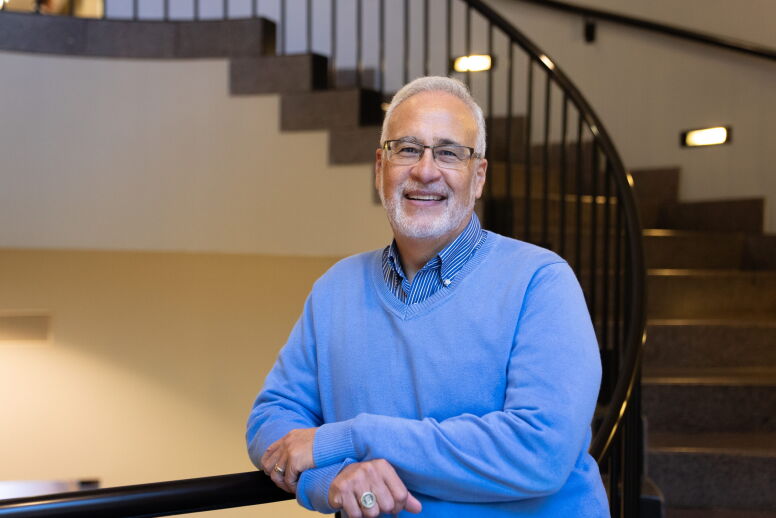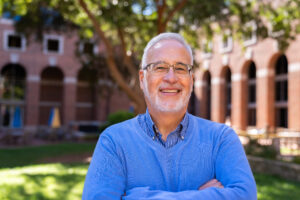News & Stories
Focusing on the intelligent and ethical adoption of AI

Professor Mark McNeilly was reading a blog post about early iterations of ChatGPT and generative AI in the economics-focused blog “Marginal Revolution” in late November 2022.
He decided to experiment with ChatGPT to learn its capabilities. After playing with it a bit, he thought, “This thing is going to change everything from education and business to warfare and politics!”
A few months later, he emailed the University of North Carolina’s provost to suggest that Carolina should start preparing for AI. When UNC commissioned its first generative AI committee, McNeilly co-chaired it with Stan Ahalt, dean of the UNC School of Data Science and Society. They focused on the creation of AI guidelines and education for UNC-Chapel Hill. A new committee was created in 2024 with McNeilly as chair to support the intelligent and ethical adoption of AI in teaching, research and operations throughout UNC.
Today, the marketing veteran has become an expert voice in a technology that has revolutionized much of how we see and understand the world.
McNeilly began teaching part time at UNC Kenan-Flagler Business School in 2006 while he was a marketing executive at IBM and Lenovo. He became interested in teaching after meeting Professor Valarie Zeithaml when she shared her insights on the firm’s marketing strategy at a Lenovo conference.
“Do you ever need an adjunct professor?” he asked her. As it turned out, she said, they were looking for a professor to teach a course on branding, which was a major focus of McNeilly’s corporate work.
He had always enjoyed giving presentations in the corporate world, taking ideas and translating them for others. He was excited to transfer that skill into the academic realm.
He taught his first course for the online MBA@UNC program when it launched in 2011, and he had left the tech world. In 2013, he became a full-time professor of the practice of marketing at UNC Kenan-Flagler.
One of the major draws of working with UNC Kenan-Flagler students and faculty is how congenial and collaborative they are. “People like to work together here,” he says. The students are intellectually curious. They want to try new and exciting things through the coursework.
That includes learning about AI. McNeilly teaches a course entitled AI Entrepreneurship, which he created after he saw that many students and faculty weren’t utilizing ChatGPT even after it became more widespread. “The goal was to teach them how to use it as a business person,” McNeilly says. “And how they could use it to accelerate the creation of a startup.”

He also educates students on the AI marketplace and the impact of AI on businesses.
For example, he showed his students how they could use AI to help define customer needs and develop a minimum viable product and business model. A fellow professor and venture capitalist who was sitting in on the class told McNeilly that “in one hour, you went through what it usually takes a venture capitalist several weeks if not months to do.’”
“Now the question is how good it is,” McNeilly says, “But that’s what you iterate and build from there.”
McNeilly teaches a variety of classes, including Global Marketing, Professional Selling, History and the Art and Science of Influence.
Outside of the classroom, McNeilly shares his thoughts and insights on the AI landscape through his Substack “Mimir’s Well.” He wrote his first post in January 2023 to share his thoughts and ideas and the potential implications of AI.
“I like to write, it’s fun,” McNeilly says, adding that he also writes about non-AI topics in the marketing and tech industries. A mid-August post explored the debate around the actress Sydney Sweeney’s American Eagle advertisements and “the power of provocation.”
McNeilly has authored several books, including “Sun Tzu and the Art of Business: Six Strategic Principles for Managers” and “George Washington and the Art of Business: Leadership Principles of America’s First Commander-in-Chief.”
“History offers many insights for business in terms of leadership, organization and change,” he says. “And Washington himself was not just our commander in chief of the Army and president but also a smart businessman as well.”
He hopes for students to learn this as well. In an undergraduate Honors class entitled History, Myth and Modern Leadership, McNeilly began with ancient mythology and fights between the gods. Then he moved the class through leaders throughout time from around the world as well as philosophers like Confucius.
“And then we used modern leadership theories to keep them up to speed with what’s going on now,” McNeilly says. “A lot of that ties into people who have been trying to lead other people since the beginning, right?”
For now, even with all the advances in AI, McNeilly says it’s the interactions with students that keep him in the classroom: the lessons they learn and that he learns as well and seeing how they apply them through their careers.
He emphasizes to his students, even in the face of technologies replacing human workers, that they should always know the value they provide.
“People above you need to know who you are and what you do,” McNeilly says. “So you not only need to provide value, but you need to be known for providing value.”